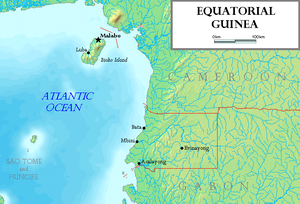 Image via Wikipedia
Image via Wikipedia
My attention was first drawn to the problem of human trafficking when my mum received a phone call from a worried relative. His son, he said, had been offered a job in Spain by a woman who had arrived in their village and was signing up young men.
"Spain?" my mum asked," are you sure?" "Yes, Malabo, Spain" he replied. First my mother broke the news to him that Malabo is nowhere near Spain - it's actually the capital of Equatorial Guinea. Then she asked what sort of job his son had been offered. The man replied that he didn't know; that was why he called, to confide in my mum that he was worried about the set up.
Apparently the woman was rounding up boys and young men who had no real qualifications or skills, and was asking them to pay a registration fee. They were going to be taken to Malabo by ship, from Calabar.
My mum made a few calls and reported the situation to someone she knew at NAPTIP, the National Agency for the Prevention of Trafficking in Persons in Abuja, who promised to investigate. Time ticked on and over the next couple of months we received a number of frantic phone calls from our relative, updating us when the village recruitment drive ended, passports were obtained and the group of eager young travellers was transported out of the village. Our relative's son was excited about the prospect of going abroad and refused to detach himself from the group despite his father's pleas. There was nothing anyone could say or do to dissuade him as he was clearly frustrated with the dire financial situation at home.
After a couple of months the woman and her group of recruits arrived in Calabar where they were eventually prevented from sailing, due to issues with the ship's papers. We don't know for sure whether this was the NAPTIP guys doing their job, but all that matters is that this particular group of young people did not end up on a ship heading to an uncertain fate.
It was after this Malabo incident that I remembered Benjamin telling me that in the late nineties, strangers would arrive in his village in Abia state every year, to recruit young people to work on cocoa farms in Ondo state. They were housed and fed but not paid until the end of the year, when they would be handed - in Benjamin's words - "twelve or fifteen thousand Naira for the whole year's work."
With my consciousness awakened to trafficking issues, I realised that the security guard in our neighbourhood who brings a steady flow of his ‘brothers' and his ‘papa brothers' to Lagos from Niger Republic, could well be a trafficker himself.
I discussed it with my mum. "In my opinion, the situation Benjamin described with the cocoa farms is not trafficking," I said (in my ignorance) "because the workers were paid. A situation where an agent secures contract workers and receives a commission can't be trafficking, can it?" We agreed that as long as the workers received payment directly and were free to come and go or to disengage themselves from the arrangement - like the guards from Niger - they could not be described as trafficked.
It turned out we were wrong. I looked up the United Nations ‘Protocol to Prevent, Suppress and Punish Trafficking in Persons, Especially Women and Children', which essentially states that trafficking in persons is the transportation of persons, by means of coercion or deception, for the purpose of exploitation such as forced labour or prostitution. This Protocol and a second one ‘The Protocol against the Smuggling of Migrants by Land, Sea and Air' fall under the UN Convention against Transnational Organized Crime.
A second check on Wikipedia defined human trafficking as ‘the practice of people being tricked, lured, coerced or otherwise removed from their home or country and then compelled to work with no payment or on terms which are highly exploitative. Victims of human trafficking can be used in a variety of situations, including prostitution, forced labour (including bonded labour or debt bondage) and other forms of involuntary servitude.'
The Malabo incident taught me one thing - human trafficking is not a remote problem that has nothing to do with us. It took a relative getting ensnared for me to think of writing an article about it. Let me bring it even closer to home - do you have a young househelp that you do not pay directly? Do you pay your help's wages to someone else? Do your helps often run away? Think about it - they may be trying to escape from the ‘agent' who trafficked them. You may not realise it but you might be unwittingly involved in trafficking.
http://234next.com/csp/cms/sites/Next/News/Metro/5477730-147/story.csp
![Reblog this post [with Zemanta]](http://img.zemanta.com/reblog_e.png?x-id=d2a0a2a7-3b51-4c9c-beff-50853c05e38b)

No comments:
Post a Comment